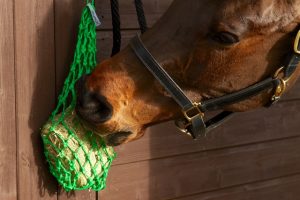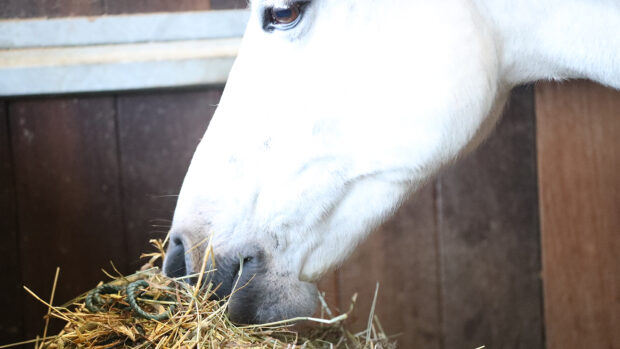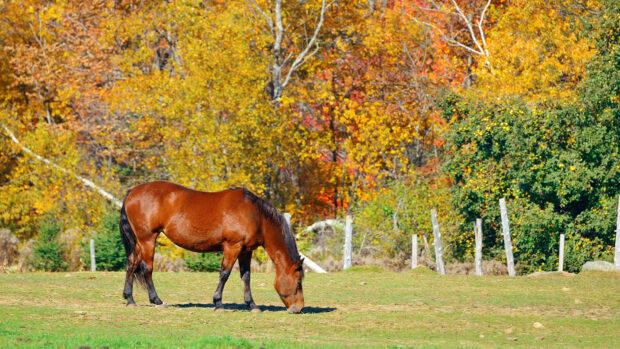Both feeding and nutrition have important supporting roles in the management of a competition horse. What and when you feed your horse influences the way they hold condition, their temperament, and their basic health.
 Inner health
Inner health
The digestive tract as a whole is huge organ that accounts for about 15% of a horse’s total weight when full, and is designed for the evolutionary horse that roamed plains, constantly eating fibrous feedstuffs. Given its size, ensuring the digestive tract functions correctly is essential for health and behaviour. The challenge with competition horse is that we often want and need to feed them differently to free roaming grazing animals, with small discrete meals and restricted forage. Changes to the diet or restricted forage can affect hindgut function and may cause colic or other digestive upset.
Forage and fibre also protect against gastric ulcers. Saliva is only produced when chewing, so between feeds, acid builds up in the stomach with the result that it reaches unprotected parts of the stomach, causing ulcers.
Chewing fibre reduces the time for that acid to build up and also creates a fibrous “matrix” within the stomach that prevents acid from “splashing” into unprotected parts of the stomach. Increasing fibre intake reduces the risk of gastric ulcers.
Read more to understand your horse’s digestion
Forage
 Each kind of forage is inherently variable in moisture energy and protein contents, and so can have a major impact on a competition horse. A concern with hay is its potential dust content in relation to respiratory health, whereas dust-free haylage can be consumed faster than hay, be nutritionally richer, and portion control can be challenging.
Each kind of forage is inherently variable in moisture energy and protein contents, and so can have a major impact on a competition horse. A concern with hay is its potential dust content in relation to respiratory health, whereas dust-free haylage can be consumed faster than hay, be nutritionally richer, and portion control can be challenging.
Power, control and condition
Another challenge is maintaining the balance between power, control and condition, especially as work intensity increases. For some horses, increasing the feed rate as work increases negatively affects behaviour; others drop condition as the work rate increases or the competition season gets going, but feeding to rectify this affects behaviour; or there’s the good doer who channel all food into condition.
For excitable horses, it is best to aim for diets based on slow-release energy from fibre and oil, whereas those requiring more sparkle may benefit from a diet higher in starch and sugar.
Those prone to conditions such as gastric ulcers, colic, laminitis or tying up, or those that hold their condition a little too well, maintaining a healthy natural metabolism is a priority and a fibre / oil based diet with very controlled starch and sugar levels is recommended.
Read more about feed management of the competition horse
 Competition day
Competition day
What to feed on competition day is the subject of much debate. Competition day means a massive change in daily routine for the horse with all the added travel and excitement that the day brings. The current consensus is to feed a little fibre and not concentrates in the preceding 4-5 hours before competing. The horse has already got the energy needed for the day ahead stored in its muscles, so all concentrates are doing is adding short term energy which may affect behaviour.
Whilst it’s tempting to withhold forage on the way there to keep the horse light, current thinking is that competition day management should be focused on health – plenty of water, small amounts of forage or chopped fibre in the morning to allow the horse to chew, provide fibre into the delicate stomach and hindgut, and contribute to the horse’s internal fluid reservoir. Fibre also has a lesser short term metabolic impact than a starchy meal, and small amounts won’t unduly affect the weight of the horse.
Competition day and munch™
 The munch™ range of healthy snacks with added benefits provide a convenient way to feed quality forage before, during and after competition. The compressed 1kg blocks of timothy grass each with added vitamins, minerals and herbs are sealed in packs which can be stored without opening ready for use at any time.
The munch™ range of healthy snacks with added benefits provide a convenient way to feed quality forage before, during and after competition. The compressed 1kg blocks of timothy grass each with added vitamins, minerals and herbs are sealed in packs which can be stored without opening ready for use at any time.
Restricted forage? For competition horses that keep their condition well and for whom forage and other feeds are restricted, using vitamunch provides a low energy, low-dust, portion-controlled way of providing high quality fibre together with vitamins and minerals in the diet. Each vitamunch weighs 1kg and when fed in a unique munch net can last over an hour.
For haylage based diets that tend to be eaten more quickly than hay, a vitamunch offers a consistent, high fibre, low energy, long-lasting addition for horses standing in for long periods of time;
On competition day, vitamunch provides a perfect fit on competition day. It makes the ideal morning fibre “chaser” to keep the digestive system healthy ahead of the day’s work; it can provide a boredom breaker for long periods waiting in the lorry or trailer, or on late running days. Fortified with additional vitamins and minerals it provides additional nutritional support on the day, and the compact, packaged form mean it fits well into any travelling situation with minimal mess;
 For excitable or anxious horses, calmmunch is a relaxing reward to support calm behaviour.
For excitable or anxious horses, calmmunch is a relaxing reward to support calm behaviour.
Feeding Post Competition
After the competition is over, feeding and nutrition tactics should focus on rehydration and replacement of energy reserves and nutrients.
The effort of competing together with the excitement of the day mean the horse has used up muscle energy reserves – how much or little depends on the intensity of the effort. Fast or intense work efforts such as cross country, polo, endurance, show jumping or point-to-pointing utilise muscle glycogen stores, which provide instant energy during work, but once used up take 72 hours to restore. (Less intense work efforts are unlikely to have used up muscle glycogen however).
Generally, after the competition, offer plenty of water plus electrolytes after exercise, taking care for it not to be too cold or for the horse to drink too much in one go. When it is particularly hot or humid or the horse is competing in particularly hard work the horse may need an electrolyte replacer added to its feed or water. Also offer plenty of forage for the horse to nibble at. A small hard (concentrate) feed, once the horse is cool and relaxed, will begin to replenish lost glycogen stores or bodyweight.
For more information visit www.equilibriumproducts.com
Equilibrium Products’ Equine Nutritionist, Ruth Bishop BSc (Hons) Dip Eq S considers some good general principles of the nutritional management of the competition horse, looking at how to feed your horse before, during and after an event.





